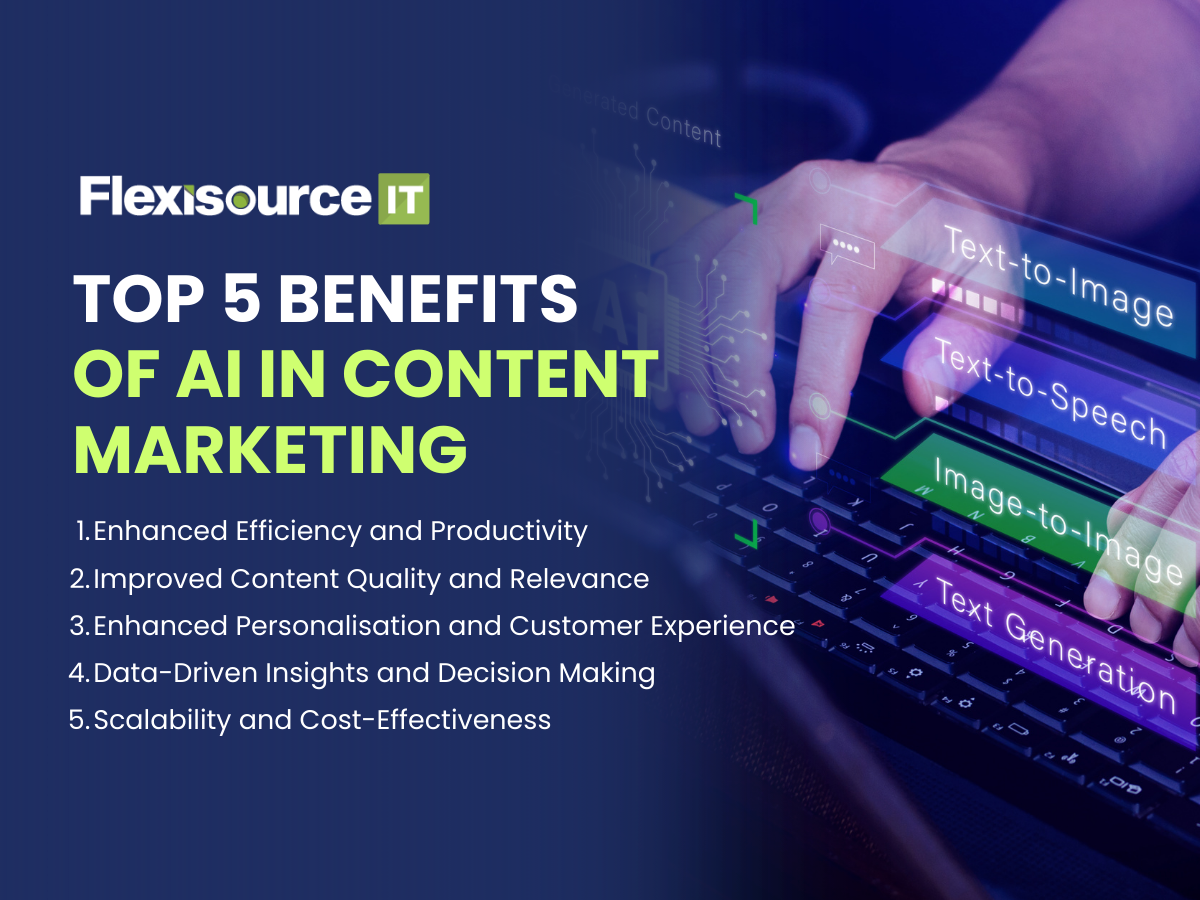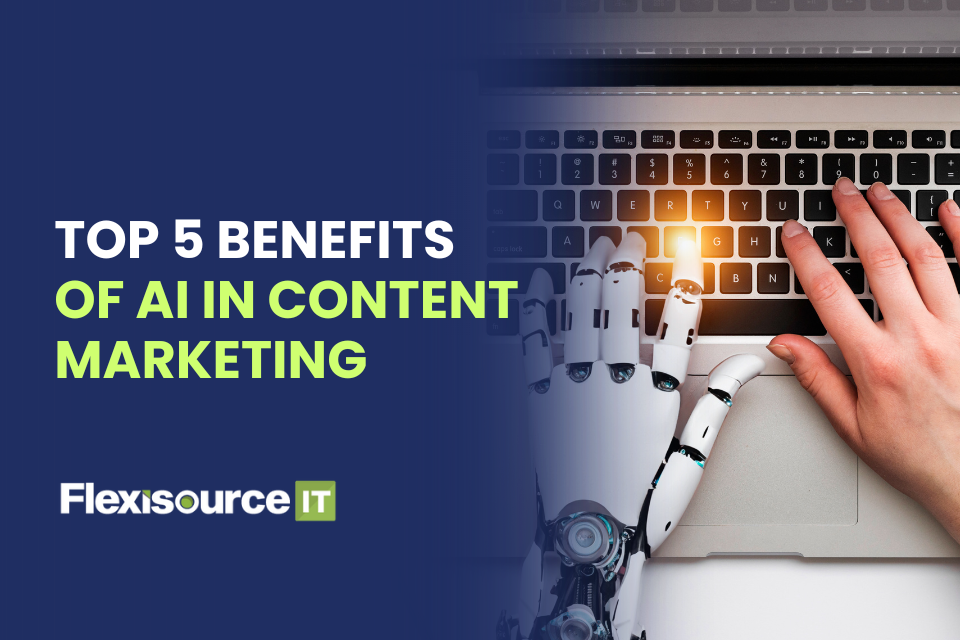In the ever-evolving digital marketing landscape, content remains essential for businesses to connect with their target market. However, keeping up with the constant demand for fresh, engaging content can be a major challenge for businesses.
This is where Artificial Intelligence (AI) steps in as a game-changer. Recently, AI has become one of the most popular and powerful tools for marketers seeking to optimise their content strategies. It offered many techniques to elevate a brand’s marketing efforts to new heights. In fact, according to Influencer Marketing Hub, 61.4% of marketers have already turned to AI for their marketing activities. Meanwhile, 44.4% of marketers explicitly use it for content production.
So, in this article, we will delve into the top five benefits of AI in content marketing. So, read on and learn more about the use of AI.
What is Artificial Intelligence (AI)?
Before delving into the benefits of AI in content marketing, it’s essential to understand what AI entails.
Basically, artificial intelligence refers to the simulation of human intelligence processes by machines, typically through algorithms and data. AI systems can analyse vast amounts of data, identify patterns, learn from experience, and make decisions with minimal human intervention.
In the context of content marketing, AI technologies enable marketers to automate various tasks, personalise content at scale, and gain valuable insights into audience preferences and behaviour.
How is AI used in Content Marketing?
The importance of AI in content marketing cannot be overstated. AI is employed through various platforms and techniques. Some of the most common applications include:
- Content Creation. AI-powered tools like natural language generation (NLG) software can generate written content based on predefined parameters and data inputs, such as articles, blog posts, and product descriptions. These tools can produce high-quality and original content at scale content.
- Content Curation. AI algorithms can analyse vast amounts of online content to identify relevant articles, news stories, and social media posts that align with a brand’s interests and target audience. Content curation tools help marketers discover fresh, engaging content to share with their followers.
- Personalisation. AI enables marketers to deliver personalised content experiences to individual users based on their preferences, browsing history, and demographic information. Personalisation algorithms can recommend products, articles, and videos tailored to users’ interests.
- Content Optimisation. AI-powered analytics platforms give marketers valuable insights into content performance, audience engagement, and conversion metrics. With AI, marketers can optimise their content strategy, refine messaging, and allocate resources more effectively to achieve their marketing goals.
- Chatbots and Virtual Assistants. AI-driven chatbots and virtual assistants can interact with customers in real time, answering questions, providing product recommendations, and guiding users through the sales funnel. These automated systems enhance customer service, improve user experience, and increase customer satisfaction.
What are some benefits of using AI in Content Marketing?
Now that we’ve explored how AI is used in content marketing, let’s delve into the benefits it offers. In content marketing, AI is not solely used for making content.
In fact, I do not recommend using AI solely for generating content and posting it as is on your website. Especially after Google’s March 2024 Core Update, which addresses spam and low-quality results. Many websites, particularly those that used AI to generate their content, were penalised by Google.
However, this doesn’t necessarily mean we should avoid using this technology. AI still has its use that marketers can take advantage of. With that said, here are some benefits of using AI in content marketing:

Enhanced Efficiency and Productivity
One of the most significant benefits of using AI in content marketing is its ability to streamline processes and increase efficiency. AI-powered tools can automate repetitive tasks such as content distribution, revision, and analysis. This can free up valuable time for marketers to focus on strategic initiatives.
For example, instead of manually ideating multiple versions of an email newsletter, marketers can use AI-powered software to generate content ideas for each subscriber. With this tool, businesses can accomplish more in less time, leading to higher productivity and faster results.
Improved Content Relevance
AI algorithms analyse data and identify patterns. In relation, AI tools can analyse user behaviour, preferences, and engagement metrics to understand what types of content resonate most with their target audience.
This insight allows marketers to tailor their content strategy, producing content that is more likely to capture attention, evoke emotion, and drive action. Moreover, this will enable marketers to create more relevant and compelling content for their audience.
Enhanced Personalisation and Customer Experience
Personalisation has become a cornerstone of modern marketing strategies. With that said, one of the top benefits of using AI in content marketing is its role in delivering personalised experiences to consumers.
Marketers can analyse vast amounts of customer data to understand individual preferences, purchase history, and browsing behaviour with AU. This insight enables marketers to deliver targeted content and product recommendations to each user, increasing engagement and conversion rates.
For example, an e-commerce retailer can use AI to recommend products based on a customer’s past purchases, browsing history, and demographic information, leading to a more personalised shopping experience.
Data-Driven Insights and Decision Making
AI-powered analytics platforms give marketers valuable insights into content performance, audience behaviour, and market trends. Through these vast amounts of real-time data, AI in content marketing can identify emerging patterns, predict future trends, and uncover hidden growth opportunities.
For example, AI algorithms can analyse social media engagement metrics to identify the most effective content types, posting times, and messaging strategies for engaging with their audience. With this insight, marketers can make data-driven decisions to optimise their content strategy, allocate resources effectively, and achieve their marketing objectives.
Additionally, AI can automate the process of A/B testing and experimentation, allowing marketers to iterate and refine their content to maximise performance quickly.
Scalability and Cost-Effectiveness
One of the best benefits of using AI in content marketing is scalability and cost-effectiveness. This allows businesses to reach a larger audience and achieve significant results with minimal resources. Unlike traditional marketing methods that require manual effort and resources, AI-powered tools can automate various aspects of content creation, distribution, and optimisation.
Similarly, AI-powered advertising platforms can optimise ad targeting, bidding, and creative placement in real time, maximising return on investment (ROI) and minimising wasteful ad spend.
Conclusion
In conclusion, Artificial Intelligence (AI) offers myriad benefits for content marketers. It enables them to enhance efficiency, content quality, and personalised experiences. And as AI continues to evolve and advance, its role in content marketing will only become more prominent.
So, watch out and empower yourself with AI to unlock new opportunities and drive innovation in the digital landscape.
To harness the power of AI in your content marketing strategy, contact Flexisource IT today! Let us help you craft compelling content that resonates with your audience and drives meaningful engagement. Reach out to us now to get started on your journey towards content marketing success.









